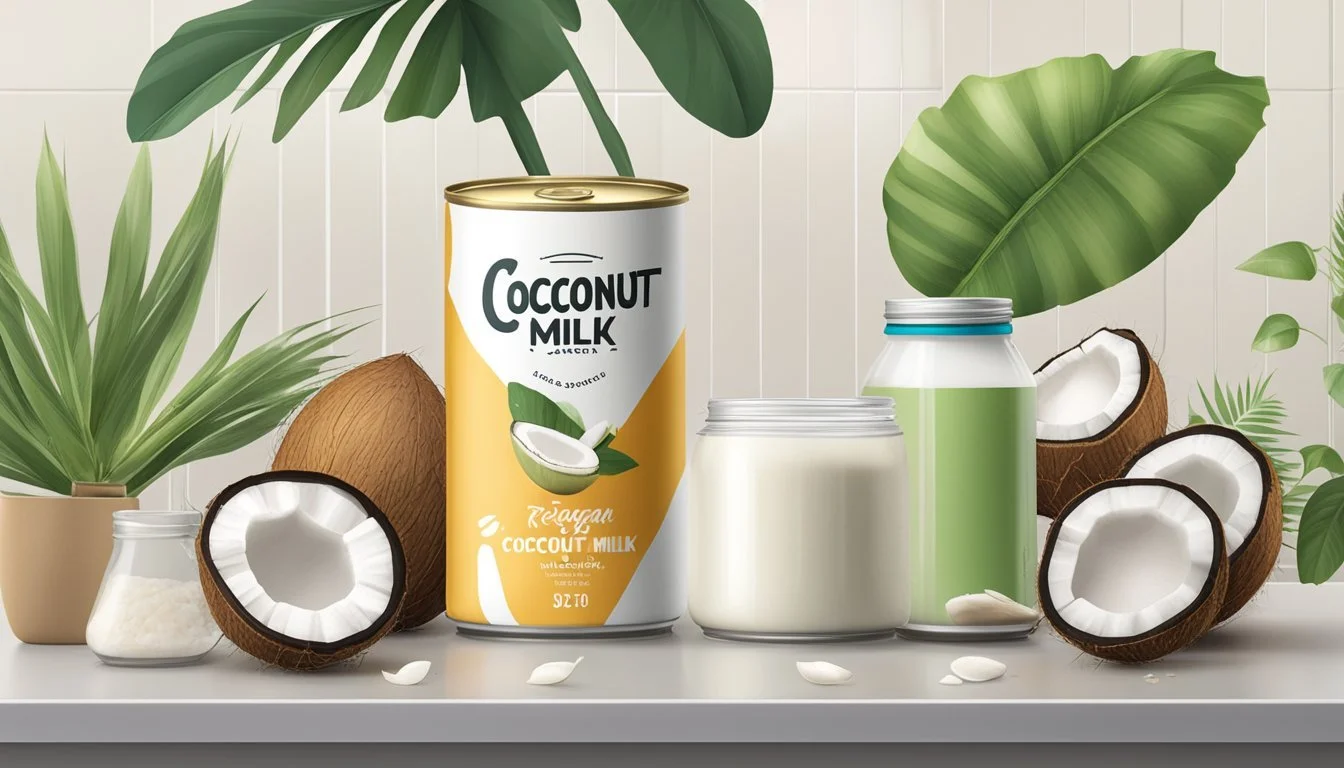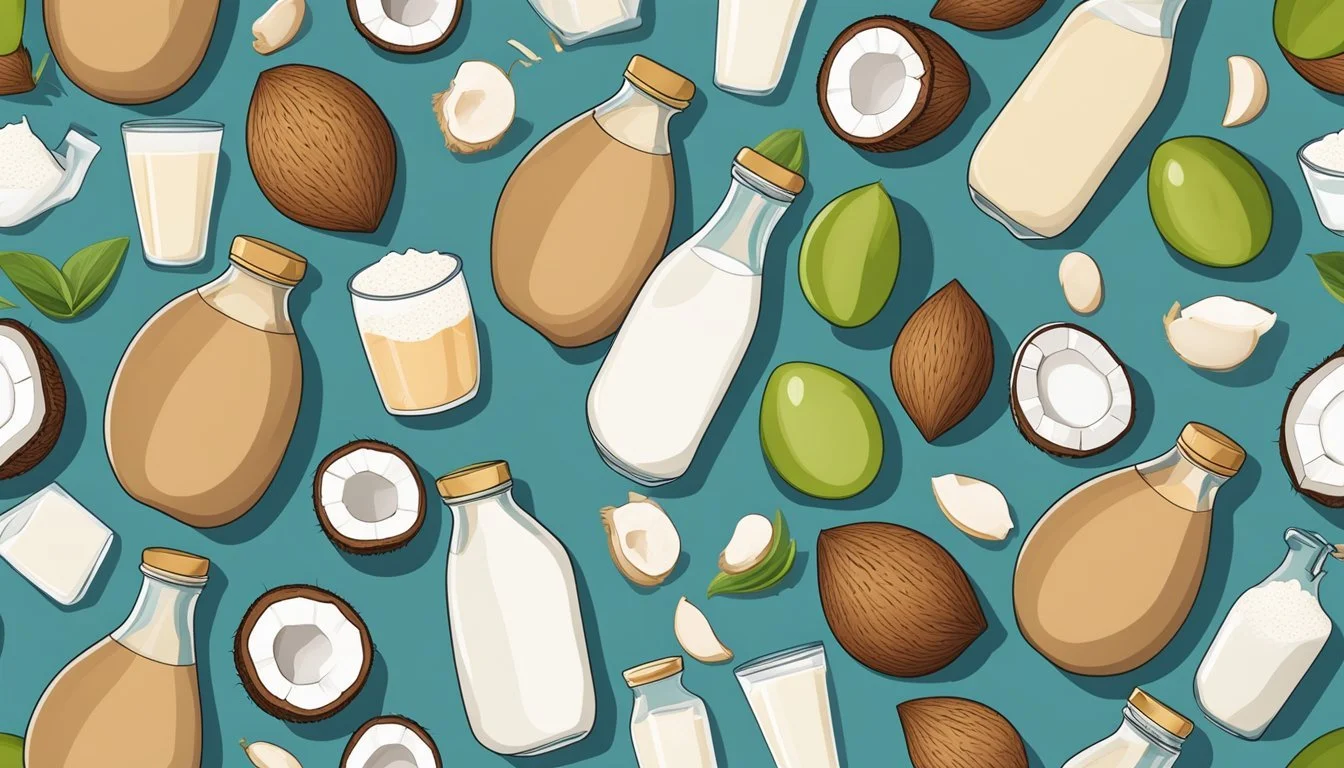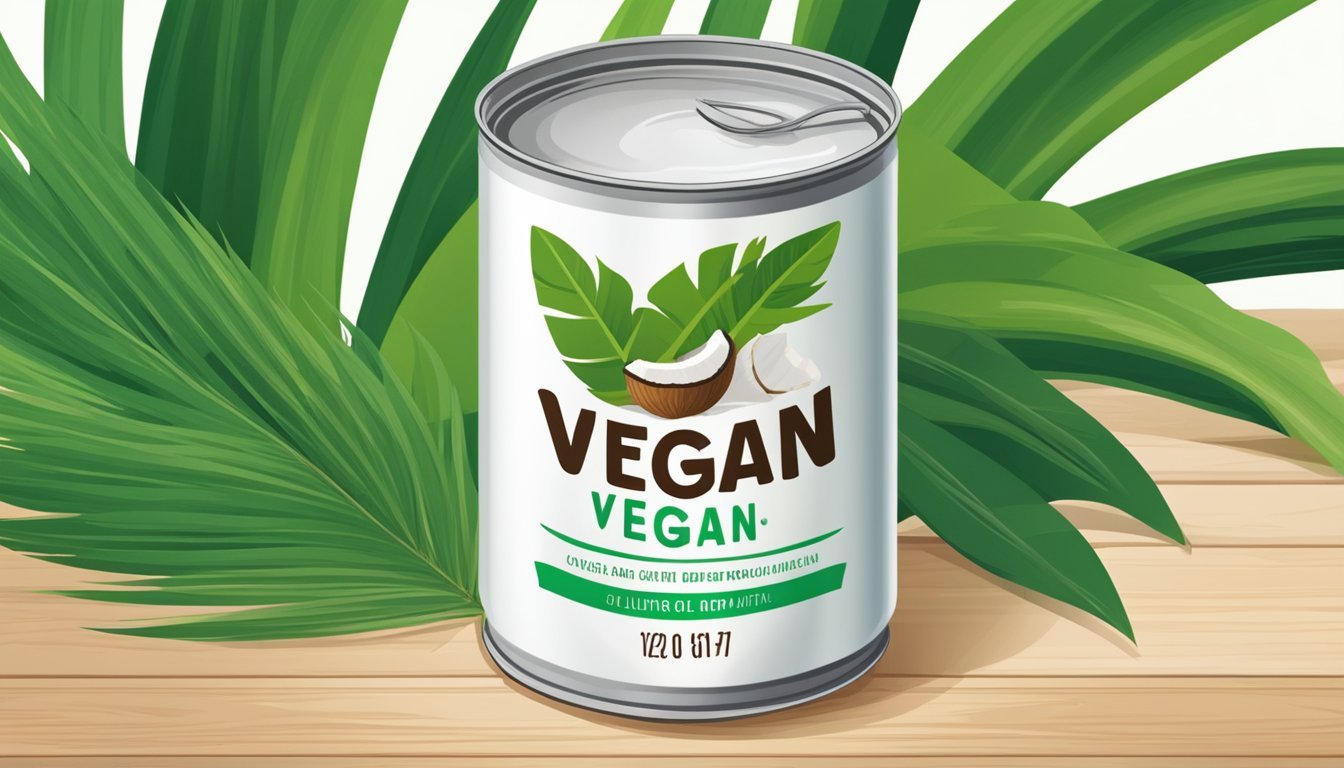Is Coconut Milk Vegan?
Understanding Plant-Based Milk Alternatives
Coconut milk, a creamy liquid extracted from the grated pulp of mature coconuts, is a staple in many culinary traditions around the world, particularly in Southeast Asian, South American, and Caribbean cuisines. Its rich texture and subtle sweetness make it a versatile ingredient, suitable for a range of dishes from curries to desserts. As a plant-based product, coconut milk inherently contains no animal byproducts, aligning it with the fundamental principles of a vegan diet, which excludes all forms of animal exploitation and cruelty for food.
However, some concerns have been raised about the ethical sourcing of coconut milk, particularly regarding the treatment of animals in the production process. Investigations have revealed that certain coconut milk producers may use monkeys to harvest coconuts, raising questions about animal welfare and the ethical implications for vegan consumers. While these instances are not representative of the entire coconut milk industry, they underscore the importance of selecting products from companies that commit to ethical production methods, ensuring that the coconut milk is truly vegan not only in substance but also in practice.
Given these considerations, consumers seeking vegan products are advised to examine the sourcing practices of coconut milk producers. Those committed to upholding vegan ethics should look for certifications or direct statements from manufacturers that verify the absence of animal labor in their supply chain. With informed choices, vegan individuals can continue to enjoy coconut milk as a part of their diet, confident in its alignment with their dietary and ethical standards.
What Is Coconut Milk?
Coconut milk is a creamy, rich liquid extracted from the grated pulp of mature coconuts. It is not to be confused with coconut water, which is the clear fluid naturally found inside young, green coconuts.
Production Process: To make coconut milk, the white flesh of the coconut is grated and soaked in hot water. The coconut cream rises to the top and can be skimmed off. The remaining liquid is then strained to produce a thinner coconut milk. This process can be repeated to obtain lighter milk.
Nutritional Content: Coconut milk contains lauric acid, a medium-chain fatty acid believed to offer numerous health benefits. This saturated fat is known for its antimicrobial and anti-inflammatory properties.
Consistency & Uses:
Full-fat coconut milk: Solidifies when cooled and can be used in recipes for its thick, cream-like texture.
Light coconut milk: Contains less fat than the full-fat version, suitable for lighter culinary applications.
Vegan Friendly:
Plant-based: Coconut milk is derived entirely from coconuts, making it a suitable option for vegans and those with dairy allergies.
In culinary contexts, it imparts a distinctive flavor and is often a staple in tropical and Southeast Asian cuisines. It's versatile and can be used in sweet and savory dishes, ranging from curries to desserts.
Coconut Milk and Veganism
Coconut milk is widely regarded as a staple in the vegan diet because it contains no animal products and is inherently plant-based. Originating from the meat of coconuts, coconut milk serves as a versatile, dairy-free alternative used in various culinary applications ranging from savory dishes to desserts like vegan ice cream.
Here are some key points about coconut milk in the context of veganism:
Vegan Composition: Coconut milk is extracted from the grated flesh of coconuts with water, resulting in a rich, creamy liquid that's inherently vegan.
Dairy-Free: As a plant-based milk, it stands out as a popular choice for those on a plant-based diet due to its similarity to cow's milk, but without any dairy content.
Culinary Versatility: Its creaminess and subtle coconut flavor enhance a wide array of recipes, from baked goods to creamy sauces.
It's essential to examine the source of coconut milk because the ethical concerns surrounding its production may affect its vegan status. Some brands have come under scrutiny for exploiting animal labor, specifically using monkeys to harvest coconuts. Animal welfare advocates argue that while the coconut milk itself does not contain animal products, the use of animal labor would render it non-vegan from an ethical standpoint.
Consumers who follow a vegan lifestyle are advised to check labels and opt for brands that guarantee ethical production practices, ensuring their choices are consistent with the ideals of veganism.
Nutritional Profile
The nutritional profile of coconut milk is defined by its caloric content, macronutrients such as protein and fats, and its vitamin and mineral composition. This profile reflects its value in a balanced diet and its role in catering to specific dietary needs.
Calories and Macronutrients
Calories: Coconut milk typically provides a moderate to high-caloric content, primarily due to its fat content.
Protein: It contains minimal protein, which is significant for those relying on it as a milk alternative to ensure adequate protein intake from other sources.
Fats: The fat in coconut milk consists largely of medium-chain triglycerides (MCTs), which are metabolized differently than other fats and may provide health benefits.
Vitamins and Minerals
Vitamin D: Not naturally occurring in significant amounts in coconut milk, but some brands fortify their products with vitamin D.
Calcium: Typically lower in calcium compared to cow's milk, though often fortified with calcium by manufacturers.
Vitamin B12: Coconut milk does not naturally contain vitamin B12, and consumers should look for fortified versions or alternative sources of B12.
Iron: Contains trace amounts of iron, which contributes to the mineral content of the milk.
The vitamin and mineral content may vary between raw coconut milk and commercial brands due to fortification. Consumers can check the nutrition labels on fortified coconut milk to assess its contribution to their daily vitamin and mineral intake.
Vegan Alternatives to Dairy
When exploring dairy-free options, it's essential to consider the wide variety of plant-based milks and the different ways they can be used in culinary applications.
Plant-Based Milk Varieties
Soy Milk: A popular staple among non-dairy milks, soy milk is known for its high protein content and close nutritional match to cow's milk. It can be used in a 1:1 ratio for dairy milk in most recipes.
Oat Milk: Noteworthy for its creamy texture and eco-friendly production, oat milk is a top choice for individuals with nut allergies. Its mild, slightly sweet flavor makes it versatile for both sweet and savory dishes.
Almond Milk: Almond milk offers a light, nutty flavor and is lower in calories and fat, making it a suitable milk alternative for those looking to reduce their caloric intake.
Coconut Milk: Characterized by its rich consistency and tropical taste, coconut milk is a vegan alternative that works well in a variety of dishes, adding a creamy texture without using dairy.
Plant Milks: In general, plant milks, which also include hemp, rice, and cashew variations, each come with unique nutritional profiles and flavors, catering to a broad range of dietary needs and preferences.
Dairy-Free Uses in Cooking
Baking with Plant Milks: In baking, non-dairy milks can often be substituted for dairy milk at a 1:1 ratio. For example, soy or almond milk can easily replace cow's milk in cakes and cookies, while coconut milk can provide a rich, creamy consistency for desserts.
Cooking with Coconut Milk: Coconut milk stands out in culinary applications, particularly in curries and soups, due to its thick consistency and rich flavor. For a lighter consistency, plant milks such as soy or oat can be thickened with cornstarch or arrowroot.
Sauces and Dressings: Non-dairy alternatives are not just limited to drinks and baking. They can also be the foundation for creamy sauces or dressings. Coconut milk, for example, makes an excellent base for vegan Alfredo sauce or mayonnaise.
By integrating these plant-based alternatives into cooking, one can enjoy a vast array of flavors and textures without relying on dairy products.
Uses in Cuisine
Coconut milk serves as a rich, dairy-free alternative in various culinary applications, from thickening beverages to creating creamy textures in savory and sweet dishes.
Traditional Preparation
Traditionally, coconut milk is extracted from the grated pulp of mature coconuts. It starts as a thick liquid that separates into a higher-fat cream and lighter milk. In its natural form, it's fundamental in many Asian cuisines. Thai curries often rely on coconut milk for their rich flavor and creamy consistency, while Vietnamese soups such as pho may use it for depth.
Indian cooking employs coconut milk in both North and South Indian curries, enhancing these dishes with its velvety texture and distinct taste. Many traditional desserts throughout Southeast Asia use coconut milk as a base; for example, it's common in sticky rice desserts and in puddings like kheer.
Versatility in Dishes
Coconut milk's culinary use extends far beyond traditional preparations. Its versatility shines in a wide range of dishes:
Smoothies: It adds creaminess and subtle sweetness, pairing well with various fruits and flavors.
Sauces: Coconut milk can form the base for many sauces, adding a silky texture to both savory and sweet sauces.
Soups: It contributes to the richness of soups, ranging from the heartier squash-based to lighter broth varieties.
Desserts: Coconut milk is a nondairy staple in desserts, useful for creating everything from ice creams and custards to toppings like whipped cream.
Moreover, one can find coconut milk as an alternative in coffee shops for lattes and cappuccinos, revealing its appeal across different food culture spectrums for its creamy, full-bodied profile.
Coconut Milk Varieties
There are several types of coconut milk available on the market, commonly found in canned or carton form. Each variety serves specific purposes in cooking and dietary preferences.
Canned Coconut Milk
Canned coconut milk is typically richer and thicker than its carton counterpart. It’s often used in recipes that require a creamy consistency, such as curries, soups, and desserts. Canned coconut milk usually separates into a thicker cream and a more liquid coconut water. There are also "lite" versions, which have less fat than the regular canned coconut milk.
Carton Coconut Milk
Carton coconut milk, on the other hand, is more diluted, making it suitable for drinking, cereal, or in coffee. It generally has a consistency closer to that of dairy milk. Carton versions are often fortified with vitamins and minerals and may have added sugars or flavors to appeal to a wider range of consumers.
Ethical and Environmental Considerations
When choosing coconut milk, consumers must consider not just the vegan nature of the product but also the ethical and environmental implications of its production and sourcing.
Sourcing and Production
The process of producing coconut milk needs to adopt sustainable and ethical standards to minimize environmental impact. Key factors include reducing land use, mitigating wildlife impact, and ensuring fair labor practices. Ethical manufacturers of coconut milk prioritize organic and responsibly sourced ingredients, steering clear of harmful pesticides and chemicals.
Labeled Products and Certifications
Consumers can look for certifications and labels that indicate ethical production practices. Products bearing labels such as "Fair Trade" or "Organic" often mean that the coconut milk adheres to certain ethical criteria regarding production and sourcing. Certifications can signal no exploitation in the supply chain and adherence to environmentally sustainable practices.
Animal Welfare Issues
Reports, including those from organizations like PETA, have highlighted concerns over monkey labor in coconut harvesting. PETA Asia investigations have revealed the use of monkeys in some areas to harvest coconuts. Some ethical brands, like Biona, have confirmed that their products are free from monkey labor, using human labor with specialized tools to pick the coconuts. Consumers looking to purchase ethical coconut milk can seek out brands that explicitly state they do not engage in such practices.
Purchasing and Storing
When purchasing coconut milk, consumers can find it readily available in the majority of grocery stores and supermarkets. As a plant-based liquid, coconut milk is a vegan-friendly item, often used as a staple ingredient in various culinary applications. Shoppers should note the difference between the drinkable carton variety and the thicker canned type mainly used in cooking.
Coconut milk in cartons typically contain additives such as thickeners or stabilizers to improve consistency and shelf life. While scanning the ingredients, individuals adhering to strict vegan standards should check for non-vegan additives. Some common non-vegan ingredients that might be found in food products include gelatin and honey.
For storage, unopened canned or carton coconut milk should be stored in a cool, dark place. Once opened, it's recommended to keep it in an airtight container in the refrigerator and use it within 5 days to ensure freshness. To achieve an even consistency, shaking the can or blending the contents before use may be necessary if separation occurs.
Proper Storage Tips:
Keep unopened coconut milk away from heat and light.
Refrigerate after opening in an airtight container.
Consume opened coconut milk within 5 days.
Shake or blend before use if separation has occurred.
Consumers making ethical vegan choices may also investigate the sourcing of their coconut milk products, ensuring that no animal exploitation, such as monkey labor, is involved in the harvesting process.
Coconut Milk in Health and Diet
Coconut milk, a plant-based alternative to dairy, is gaining popularity for its potential health benefits, which include supporting weight loss efforts and acting as a suitable option for individuals with certain allergies or intolerances.
Weight Loss and Metabolism
Coconut milk contains medium-chain triglycerides (MCTs), a type of fatty acid that they are metabolized differently than other fats. Rather than being stored as fat, MCTs are quickly converted into energy, which can boost metabolism and may aid in weight loss. However, coconut milk is also high in calories, so portion control is crucial.
Allergy and Intolerance Considerations
Coconut milk is a lactose-free alternative, making it a suitable option for those with lactose intolerance. Its antimicrobial properties are attributed to lauric acid, an MCT found in coconut milk. Those with tree nut allergies should typically not experience allergic reactions to coconut milk, as it is not a tree nut, but individual sensitivities can vary.
Frequently Asked Questions (FAQ)
Is coconut milk vegan?
Yes, coconut milk is vegan as it's derived from the coconut fruit and does not contain any animal products. It's a popular choice for vegans due to its creamy texture and rich flavor.
What's the difference between coconut milk, coconut water, and coconut cream?
Coconut milk is extracted from the grated flesh of mature coconuts, mixed with water, and has a creamy texture.
Coconut water is the clear liquid found inside young, green coconuts and has a lighter, refreshing taste.
Coconut cream is thicker and richer than coconut milk, with less water content. It's made from simmering four parts shredded coconut in one part water.
Can coconut milk be used in place of dairy milk?
Absolutely. Coconut milk can be used in a variety of vegan recipes as a substitute for dairy milk. It often comes in cartons and has a thinner consistency, similar to dairy milk, making it suitable for cereals, beverages, and baking.
Is carton coconut milk different from canned?
Yes, carton coconut milk is often fortified with vitamins and minerals and may have a thinner consistency. It's usually intended for drinking or light culinary applications. Canned coconut milk, typically richer and thicker, is better suited for cooking and baking.
Do I need to choose fortified coconut milk?
Choosing fortified coconut milk can provide extra nutrients, such as calcium and vitamin D, that one may miss from a non-dairy diet. However, it depends on personal dietary needs and preferences.
Summary and Conclusion
Coconut milk, derived from the flesh of coconuts, is a plant-based product that is inherently vegan. It serves as a lactose-free replacement for dairy milk and contributes to the variety of a vegan diet with its rich, creamy texture and distinct coconut flavor. Coconut milk is often celebrated for its health benefits, including a nutrient-rich profile and healthy fats.
When selecting coconut milk, consumers should be aware of the ingredients list, as some brands may include stabilizers, emulsifiers, or preservatives. It is essential to verify that these added components are plant-based. For example, organic guar gum is commonly used as a stabilizer and is generally accepted within a vegan framework.
Furthermore, ethical concerns regarding the harvesting process must be considered. Certain practices, such as using monkeys for coconut picking, fall outside of vegan ethical standards. Therefore, it is advisable to choose products certified as ethical, ensuring no animal exploitation occurs.
In summary:
Coconut milk is suitable for vegans when confirmed free of animal-derived additives.
Choose canned coconut milk for fewer ingredients and a more straightforward composition.
Consider the ethical aspects of harvesting to support animal welfare alongside vegan dietary choices.
It is recommended for those following a vegan lifestyle to conduct a degree of due diligence, reading labels and researching practices of coconut milk brands, to ensure that one's dietary and ethical standards align.







